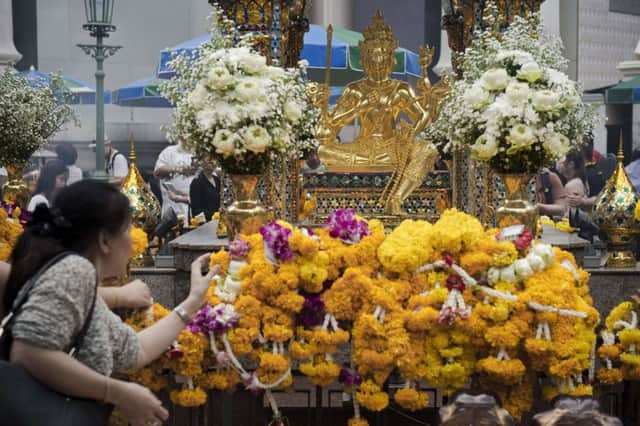‘Morale Boost’ as Thai shrine centrepiece restored


In the past week, police have arrested two people and identified seven more believed to have been part of a network that carried out the 17 August attack, which also injured more than 120 people. They have intentionally avoided calling it an act of terrorism for fear of hurting Thailand’s image.
“The most important issue for the country’s image is to restore confidence about safety,” culture minister Vira Rojpojchanarat said at yesterday’s ceremony. He said the event was intended to “create confidence and raise the morale of [Thai] people and tourists”.
Advertisement
Hide AdAdvertisement
Hide AdThe ministry’s fine arts department has repaired 12 areas of the shrine’s gleaming golden statue of the Hindu god Brahma that were damaged by the attack, notably on its four-headed face where a chin was blasted out.
“Every day the police and national security are making progress on the case,” Mr Rojpojchanarat said.
In the past week, the investigation has picked up pace, with police arresting the two suspects and carrying out two raids on homes in Bangkok where bomb-making materials were discovered. In a third raid on Thursday, authorities found “suspicious fluid in a barrel” that was being analysed by explosives experts.
Thai authorities have suggested at least two of nine suspects are possibly Turkish.
That prompted the Turkish Embassy in Bangkok to say it had not received confirmation from Thai authorities about the nationalities of the suspects.
The Turkish connection has boosted a theory that the suspects may be part of a group seeking to avenge Thailand’s forced repatriation of more than 100 ethnic Uighurs to China in July.
Thailand is believed to be a transit stop for Chinese Uighurs attempting to go to Turkey.
Uighurs are related to Turks, and Turkey is home to a large Uighur community.
Advertisement
Hide AdAdvertisement
Hide AdThe Erawan Shrine is especially popular with Chinese tourists, feeding speculation that it could have been targeted by people who believe the Uighurs are oppressed by China’s government.
China has alleged that the repatriated Uighurs included some who intended to join Islamic State fighters in Syria.
In another finding that could support a link to Uighurs, police said a man arrested on Tuesday, who is considered a main suspect in the bombing, had been carrying a Chinese passport.
The passport indicated he was from the western Chinese region of Xinjiang, but Thai authorities had not yet verified its authenticity, police spokesman Prawut Thavornsiri said. Xinjiang is the home of the Turkish-speaking Uighurs.
The authorities said they had identified the suspect but issued two different spellings of his name – Mieraili Yusufu and Yusufu Meerailee – and said he faced charges of possessing unauthorised explosives.
Police said they found his fingerprints on a bottle of bomb-making material recovered from a flat that was raided over the weekend.
The other suspects include a Thai woman identified as Wanna Suansan and said to be married to a Turkish man. Both are being sought by Thai police.